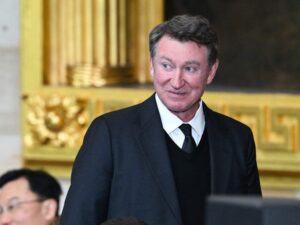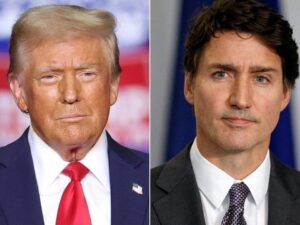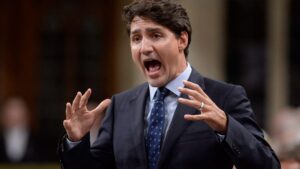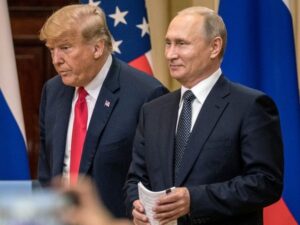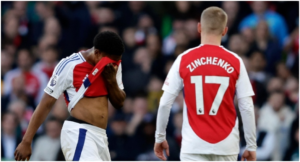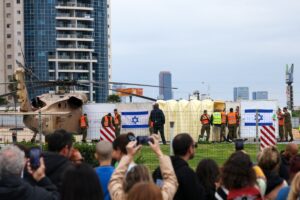
Canada will spend $500 million to help Ukraine’s military fight Russia’s invasion, Prime Minister Justin Trudeau said Saturday in Kyiv, where he told the country’s parliament they are in a battle for “the future of us all.”
“You are the tip of the spear that is determining the future of the 21st century,” Trudeau said during a 25-minute speech before a special session of the national legislature, known as the Verkhovna Rada.
Pledging more weapons and fighter-pilot training for Ukraine, Trudeau alsotold the lawmakers that Canada will support their country’s bid for membership in the NATO military alliance.
“We want peace on Ukrainian terms,” he said. “Russia must completely and unconditionally withdraw all its military forces from Ukraine.”
Trudeau received several standing ovations in his speech, and a warm embrace from Ukraine’s President Volodymyr Zelenskyy. Two legislators were holding Canadian flags.
“Canada will continue to stand with Ukraine with whatever it takes, as long as it takes,” Trudeau said earlier Saturday at a press conference while standing beside Zelenskyy.
“You’re fighting for your country and for values like democracy, freedom, respect, and dignity. And in fighting for Ukraine, you’re also fighting for the future of us all,” Trudeau told Zelenskyy.
The visit, which was at the invitation of Ukraine, comes amid signs that a long-awaited spring counteroffensive against Russia could be underway.
It is also happening during wildfires across Canada, with smoke reducing air quality, and after Friday’s resignation of the special rapporteur Trudeau had assigned to probe foreign interference.
“Canada will be part of the multinational efforts to train fighter pilots and to help maintain Ukraine’s fighter-jet program, leveraging Canadian expertise in these areas,” Trudeau said during the news conference, adding that Canada will join a team of countries helping to maintain tanks, while providing additional missiles and rounds of ammunition.
That includes 288 more AIM-7 missiles for warding off Russian airstrikes, and reallocating existing funds for 10,000 rounds of 105-millimetre ammunition, Trudeau said.
The prime minister also announced $10 million in new funding to support those coping with a worsening humanitarian situation in southern Ukraine after the collapse of a hydroelectric dam this week, along with $37.5 million in aid previously earmarked for the country.
The Nova Kakhovka hydroelectric dam on the Dnieper River has flooded a large part of the front line in southern Ukraine, an area that was already undergoing shelling.
It remains unclear how the dam collapse happened. Kyiv has accused Russia of blowing up the dam and its hydropower plant, which Russian forces controlled. Moscow said Ukraine did it.
Trudeau did not attribute direct responsibility for the dam’s collapse, but said it’s ultimately Russia’s fault.
“This was a direct consequence of Russia’s war and it is devastating for thousands upon thousands of people,” he told reporters.
Trudeau also announced more sanctions on 24 individuals and 17 entities for alleged support of Russia’s invasion of Ukraine.
He also said the federal government would try to seize a massive Russian-registered Antonov 124 cargo plane that Canada grounded after it landed at Toronto Pearson International Airport in February 2022.
The prime minister said Canada will try to forfeit the plane to Ukraine, so it can’t be used to support Russia’s war effort. Ottawa has legislation to forfeit assets of people sanctioned by Canada, but as of a month ago it had not filed any court application despite promising last December to seize assets held by oligarch Roman Abramovich.
The list of those being sanctions was not immediately available from Trudeau’s office on Saturday.
The two leaders also issued a joint declaration with a dozen points that largely reiterated Canada’s actions for Ukraine. It mentioned “the need to strengthen efforts to ensure the effective implementation of sanctions and to prevent and counter circumvention in and by third countries.”
Deputy Prime Minister Chrystia Freeland joined Trudeau on the trip, which began with the laying of a wreath at the Wall of Remembrance at St. Michael’s Golden-Domed Monastery.
Freeland also placed some flowers at the wall, which features photos of Ukrainians who have died while defending their homeland since Russia’s initial invasion in 2014. Both met Ukrainian soldiers there for the event.
On his way to the wall, Trudeau at one point crouched down low to look inside one of the frames of burnt-out Russian tanks and military vehicles that fill a public square. Not long before Trudeau and Freeland arrived, there was sombre music and an honour guard for a casket carried into the cathedral for a funeral.
This is the second time that Trudeau has made an unannounced visit to the embattled country since Russia began its large-scale invasion of Ukraine in February 2022.
Trudeau last travelled to Ukraine just over a year ago, where he reopened the Canadian Embassy in Kyiv and met Zelenskyy in person for the first time since the war began.
Some media outlets, including The Canadian Press, were made aware of this new trip ahead of time on the condition that it not be reported until it was made public, for security reasons.
Trudeau met Zelenskyy in the building housing his office, and the pair then took part in an expanded bilateral meeting with some of both Zelenskyy and Trudeau’s senior advisers, Freeland and Ukraine’s trade minister, as well as both countries’ ambassadors.
Zelenskyy thanked Canada for taking in thousands of Ukrainians fleeing the conflict. “We need more friends like Canada,” he said.
The visit coincides with Ukraine’s gradual ramping up of military activity. Moscow has claimed that Ukraine’s long-promised spring counteroffensive is already happening, while Ukraine’s top military brass confirmed Saturday that “heavy battles” were underway and that Russia was launching air and artillery strikes in Ukraine’s southern Kherson and Zaporizhzhia regions.
On Friday, Russian President Vladimir Putin said Moscow will deploy some of its tactical nuclear weapons to Belarus next month, a move that the Belarusian opposition described as an attempt to blackmail the West ahead of a July meeting of the NATO military alliance.
Ottawa has contributed more than $8 billion to efforts related to the war in Ukraine since last year. That has included launching a special immigration program to allow Ukrainians to come to Canada quickly with a temporary work and study permit, instead of going through the usual refugee system.
The money includes $1 billion in military support, including the donation of eight Leopard 2 main battle tanks to Ukraine and training for its medics and soldiers in third countries like Latvia.


